|
BOSNIA - REFLECTIONS ON TIMES PAST
by Major General P G Williams CMG OBE
formerly Coldstream Guards
|
A quarter of a century has gone by since the 1st Battalion Coldstream Guards armoured infantry battlegroup deployed to central Bosnia on Operation GRAPPLE 3 as part of UNPROFOR (the United Nations Protection Force) and in direct support of the humanitarian endeavours of UNHCR (the UN High Commissioner for Refugees). From early November 1993 until early May 1994, with C Squadron of the Light Dragoons under command, the Coldstream, as BRITBAT, managed to keep open the sole main supply route (MSR) from the Croatian border northwards, via Tomislavgrad (TSG), Gornji Vakuf (GV) and Vitez, to the UNHCR’s central Bosnian distribution centre in Zenica.
While the actual conduct of the operation was discussed in this magazine at the time, it seems timely to consider just how much Operation GRAPPLE differed from the operations in Iraq and Afghanistan which have dominated the careers of most British soldiers since the start of the 21st century.
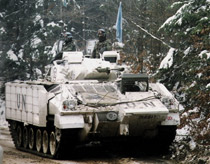 A Warrior operating during the
A Warrior operating during the
Bosnian winter |
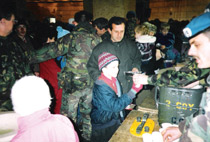 A children’s Christmas party for
A children’s Christmas party for
a cut-off community |
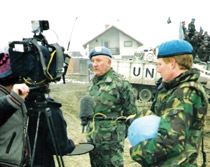 General Sir Peter Inge, then CGS, with Major Bill Cubitt, meets the press in Vitez
General Sir Peter Inge, then CGS, with Major Bill Cubitt, meets the press in Vitez |
First, it was obviously unusual that UNPROFOR’s contingents were initially deployed and set up ‘stepping stone’ bases (TSG, GV and Vitez) before any civil armed conflict had actually broken out in Bosnia. Even after the warring factions (Serb, Croat and the Sarajevo-government Bosniak forces) had started to fight one another, all UN operations, both military and humanitarian, had to be based on consent being offered by the combatant parties. Passage through active front lines could not be forced by the UN; all access had to be negotiated with factions whose primary concern was winning battles, rather than ensuring the delivery of humanitarian aid. Our fleet of Warriors certainly impressed the local warring parties, but our most persuasive capability where consent was concerned was the negotiating skills of our company commanders, their liaison officers and our locally employed interpreters.
By the time the Coldstream arrived as the third BRITBAT battlegroup (after the Cheshires and the PWO), any lingering ideas about traditional UN peacekeeping had been jettisoned; there was very much no peace to be kept in Bosnia. The Serbs controlled more than half of the country, had expelled most of their Croat and Bosniak (mostly Muslim) neighbours and were severely restricting UN access to their ethnically cleansed territory. Meanwhile the Croats were fighting to defend communities that were cut off in central and northern Bosnia and the Bosniaks were desperately fighting to maintain their Sarajevo-based government’s dream of a multi-ethnic country, seeking to harness international media support and public sympathy in the face of a crippling UN-imposed arms embargo.
Second, it was immediately clear that the campaign to keep open the MSR and so allow humanitarian convoys to deliver aid to the hundreds of thousands of vulnerable displaced persons in central Bosnia was perfectly suited to the mentality of the members of our battlegroup, drawn as they were from all the regiments of the Household Division. This was no theatre of operations for mindless ‘trained killers’; it demanded the common sense, determination, even-handedness and compassion that characterised ‘the yeoman of England’ and no one better embodied these attributes than our Guardsmen.
Third, the operational challenges facing us were considerable. The warring factions played every trick in the book to try to get the Coldstream to favour them over their opponents. From October 1993 until March 1994 the Battalion’s area of operations was declared to be too dangerous for operations by British or other UNPROFOR helicopters, meaning that any casualties would have to be dealt with in situ by the MST (Mobile Surgical Team) in Vitez, rather than being able to be casevac’d by helicopter out of the combat zone.
One positive aspect of the non-availability of helicopters during the months of fiercest fighting was that the Battalion was not bothered by endless VIP visitors flying in for ‘media opportunities’. From mid-March 1994, when the Bosniak-Croat civil war was over, a steady stream of VIPs made up for their earlier absence. One very senior British politician lost a fair degree of credibility when he refused to don a helmet in order to pose for photographs in an armoured vehicle; his press aide said that the refusal reflected the politician’s concern lest his hair was messed up by the helmet!
Communications presented particular problems for a battlegroup that was operating in mountainous terrain and with its bases stretched out as ‘stepping stones’ tens of kilometres apart from one another. Our armoured vehicles were designed and optimised for operations on the north German plain and so their VHF radios were poorly suited to our needs. Lone armoured vehicles had to be deployed as radio relays but were often at risk of being attacked and hijacked by warring parties; this was indeed the fate of a Mortar Platoon AFV 432 in December 1993.
The radio links with HQ BRITFOR, the 1-star British contingent headquarters on the Croatian coast near Split, were inadequate, but they did at least give us the opportunity to declare ‘Nothing heard, Out’ when attempts to micro-manage operations in central Bosnia from a sun-lounger by the Adriatic became too much of an irritant! This was probably the last campaign in which a commanding officer was still able to operate without constant nit-picking interference from higher levels of command. HF radio and fax transmissions down Euromux satellite telephone links were the other means of exclusively official communication up and down the chain of command from battalion headquarters; neither provided flawless transmissions by day or by night.
The mid-1990s was an era before the advent of widely available wireless telephony and social media. All ranks had to rely on BFPO ‘bluey’ aerogramme letters to send and receive news from home; the average bluey took about 4-5 days from sender to recipient.
In the week before Christmas 1993 British Telecom provided a special video link from Vitez to our home base, Oxford Barracks in Münster. This miracle of modern electronics gave most members of the Battalion a single chance to speak for a couple of minutes to their families back in Germany. The system worked well, except for one officer whose wife turned up in a fur coat and decided to show him what he was missing, not realising that everyone else in the queue in Vitez also got to enjoy the same spectacle!
Another novelty for those of us on Operation GRAPPLE 3 was the constant presence of the international press in Vitez, which, along with Sarajevo, formed one of the media hubs during the campaign. The Battalion inherited a relationship with the BBC, ITN, and the British newspaper journalists that was completely different from the situation during the Falklands and First Gulf Wars and in Northern Ireland.
Every day in Vitez our dedicated PInfo (Public Information) team briefed the media in detail about the operational challenges. BRITBAT also provided logistic support, albeit unofficially, to the news teams; they ate in our cookhouse, our REME fitters helped keep their armoured jeeps roadworthy and we developed a close understanding of one another’s needs. Naturally, there were always challenges, not least because the media was focused on ‘bad news’, while we were trying to create ‘good news’, but many of us formed lasting friendships with the correspondents during those ‘interesting times’.
Although we in Vitez enjoyed working closely with the journalists, the Ministry of Defence found it very frustrating that it was no longer in a position to filter and censor the news that was coming directly from a theatre of operations. For the first time on British military operations, print, radio and television journalists were able to file their copy live from the field.
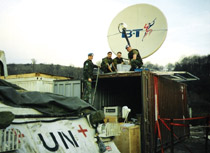 Royal Signals personnel setting up the video link
Royal Signals personnel setting up the video link |
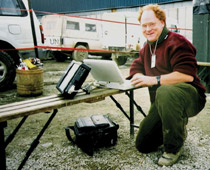 The Daily Telegraph’s Robert Fox filing his copy
The Daily Telegraph’s Robert Fox filing his copy |
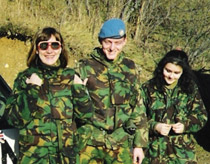 Captain Ed Macfarlane and two of our intrepid interpreters
Captain Ed Macfarlane and two of our intrepid interpreters |
The final aspect of Operation GRAPPLE 3 that differed markedly from more recent operations in Iraq and Afghanistan was the relationship that BRITBAT had with its locally employed interpreters, who had been recruited to make up for the near-total lack of native or otherwise competent Serbo-Croat speakers in the British Army. We arrived in Bosnia to discover that the Cheshires and the PWO had depleted the pool of talent by persuading a number of the young ladies to marry some of their bachelor officers.
Nevertheless, the interpreters whom we inherited were simply excellent. Most were in their twenties, had studied English at high school or had even taught the subject, and all were fearless, going without any objections wherever they were taken (except over front lines into Serb-held areas). Without their linguistic skills our attempts to achieve the critical element of consent would have come to nothing and the humanitarian support operations would have failed.
All of our BRITBAT interpreters wore British DPM combat clothing and were treated as members of the Officers’ Mess, spending countless evenings relaxing with the Battalion’s officers in the barely converted discotheque that served as the mess. It soon transpired that the songs of ABBA were central to many of the interpreters’ love of our language. The lyrics, all written in excellent English, reminded them of happier times before Yugoslavia fell apart and had inspired them to master our language. Woe betide anyone who attempted to hide the CD of ABBA that was often played on the Officers’ Mess music centre!
Life and soldiering have moved on hugely in the past 25 years, but the memories of that dramatic Balkan winter live on for those of us who were privileged to serve in the Coldstream battlegroup and who helped to some extent to ease the plight of countless displaced Bosnians. |
|






